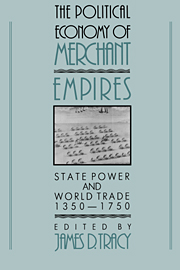Book contents
- Frontmatter
- Contents
- Acknowledgments
- Introduction
- 1 Institutions, Transaction Costs, and the Rise of Merchant Empires
- 2 Merchants and States
- 3 The Rise of Merchant Empires, 1400–1700: A European Counterpoint
- 4 Europe and the Wider World, 1500–1700: The Military Balance
- 5 The Pirate and the Emperor: Power and the Law on the Seas, 1450–1850
- 6 Transport Costs and Long-Range Trade, 1300–1800: Was There a European “Transport Revolution” in the Early Modern Era?
- 7 Transaction Costs: A Note on Merchant Credit and the Organization of Private Trade
- 8 Evolution of Empire: The Portuguese in the Indian Ocean During the Sixteenth Century
- 9 Comparing the Tokagawa Shogunate with Hapsburg Spain: Two Silver-Based Empires in a Global Setting
- 10 Colonies as Mercantile Investments: The Luso-Brazilian Empire, 1500–1808
- 11 Reflections on the Organizing Principle of Premodern Trade
- Selected Bibliography of Secondary Works
- Index
2 - Merchants and States
Published online by Cambridge University Press: 25 March 2010
- Frontmatter
- Contents
- Acknowledgments
- Introduction
- 1 Institutions, Transaction Costs, and the Rise of Merchant Empires
- 2 Merchants and States
- 3 The Rise of Merchant Empires, 1400–1700: A European Counterpoint
- 4 Europe and the Wider World, 1500–1700: The Military Balance
- 5 The Pirate and the Emperor: Power and the Law on the Seas, 1450–1850
- 6 Transport Costs and Long-Range Trade, 1300–1800: Was There a European “Transport Revolution” in the Early Modern Era?
- 7 Transaction Costs: A Note on Merchant Credit and the Organization of Private Trade
- 8 Evolution of Empire: The Portuguese in the Indian Ocean During the Sixteenth Century
- 9 Comparing the Tokagawa Shogunate with Hapsburg Spain: Two Silver-Based Empires in a Global Setting
- 10 Colonies as Mercantile Investments: The Luso-Brazilian Empire, 1500–1808
- 11 Reflections on the Organizing Principle of Premodern Trade
- Selected Bibliography of Secondary Works
- Index
Summary
INTRODUCTION
Any study of the effects of politics on economic life, especially longdistance trade, runs a grave danger of ratifying the present from the past. We know that one country which created a merchant empire also produced late in the eighteenth century the Great Transmutation of commercial, scientific, and industrial revolutions. There is the obvious danger of seeing the whole period from 1350 to 1750 as a prolegomena to this achievement, and merely looking for the processes in this long early modern period that contributed to the end result of British supremacy. Such an approach can produce distortions of the actual experience of those centuries. Even European “expansion” was not new in the late fifteenth century. Relevant and cautionary here are works by Jones and Scammell; they point to a very long history of European expansion, both internal and external, far predating 1492 or 1498. Scammell's whole book is designed to show elements of continuity in European expansion from 800 to 1650 (he should have gone on to 1750, for it is about then that we can begin to find generic change).
My contribution to this collection lies at the cutting edge of economic history today, for it tries to analyse the effect of one exogenous variable, namely politics, on economic behavior. Before World War II, at least in the English-speaking world, economic history was concerned with wider influences, with political, social, and even ideological and religious impacts on economic activity. Subsequently, economic historians did two things.
- Type
- Chapter
- Information
- The Political Economy of Merchant EmpiresState Power and World Trade, 1350–1750, pp. 41 - 116Publisher: Cambridge University PressPrint publication year: 1991
- 24
- Cited by

